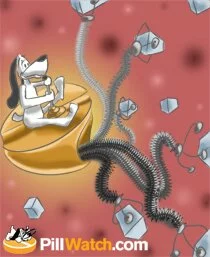
While insulin injections still remain the only treatment against type 1 diabetes, those people, who suffer from type 2 diabetes, which is a far more widely spread form of diabetes, receive new and new medications to prevent further development of their disorder and normalize blood sugar. Though the development of anti-diabetes oral pills, such as metformin or sulfonylurea drugs, brought many improvements and conveniences for patients, people with type 2 diabetes still have to stick to a tough regimen of taking pills in a particular time several times per day in order to maintain their blood sugar at the appropriate level.
Januvia is the prescription medication, which contains sitagliptin as the main working ingredient. Sitagliptin is an inhibitor or blocker of dipeptidyl peptidase-4 (DPP4) – human protein, playing a major role in the regulation of glucose metabolism.
By the way, the ability of Januvia to affect incretins makes it close to another brand-new medication against type 2 diabetes, called Byetta. However, on more detailed level the modes of action of both medications are absolutely different.
Another side of Januvia’s mode of action is that the medication continues to work even between meals, decreasing the amount of sugar, which is produced in the liver. Thus, Januvia seems to be a kind of “clever” pill, constantly monitoring the amount of sugar in blood and helping the human body keep it at the appropriate level.
The safety profile of Januvia with the rate of side effects similar to a placebo pill is widely claimed to be a great benefit of the medication along with its unique mode of action. Though the possibility of personal allergic reaction still cannot be excluded, the most common side effects, associated with Januvia, are stuffy or runny nose, upper respiratory tract infections, sore throat, and headache. Not bad for the medication, which deeply interferes into the biochemical processes in the human organism…

But even this pot of honey is not made without a fly. Some sources associate Januvia with the increased risk of some cancers. Obviously, such concerns arise from the fact that DPP-4 (chemical substance, which is suppressed by Januvia) along with participating in glucose metabolism also works as a suppressor in the development of some cancers and tumors. Of course, Januvia cannot cause cancer, but theoretically it may reduce the protective strength of an organism against cancer development. However, extensive clinical studies did not show any evidences of at least minimal risk of cancer, associated with Januvia use.
So, with the unique two-fold mode of action, extremely convenient administration regimen (one oral pill per day at any time irrespectively to food intake) and a safety profile similar to an empty placebo pill, Januvia seems to represent a real breakthrough in the management of type 2 diabetes.
| Tip for you : Sign-in with Your OpenID and post faster, easier and with easy access to all your past posts. | |
|
Your Nick: |















